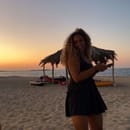Palestinian-French-Algerian artist Saint Levant was born Marwan Abdelhamid in Jerusalem, and he now resides in Los Angeles. His name represents a reclaiming of the orientalist fancies that the Levant has traditionally been a victim to. He was raised in Gaza and later Amman.
Saint Levant was scheduled to play a concert in Washington, D.C. next week, which would have been a celebration for the Arab diaspora to establish connections with those who have had comparable cultural uncertainty and dislocation. However, with the conflict in Gaza, Levant announced on social media the cancellation of his USA tour on Oct. 16, a week before he was meant to kick off his tour in Washington, D.C. A majority of his fans rushed to his support in the comments section to demonstrate that he is “a man of principle” and that it was the right call to not perform in a country that is currently seen to be funding the genocide of Palestinians in the Middle East.
Saint Levant’s rise in the music industry, especially in Western media, can be accredited to the release of his song “Very Few Friends” in November 2022. His song inspired millions of TikToks and has close to 70 million streams on Spotify . Levant raps in French, Arabic and English over jazzy guitar and heavy percussion to create a poetic romance song. Many notable influencers used the sound in their TikToks, including Dixie D’Amelio, Sabrina Carpenter, Zack Bia and Anastasia Karanikolaou.
However, before 2022 Saint Levant was releasing music that formed and connected the Arab/Palestinian diaspora. A notable release was his first song “Jerusalem Freestyle.” Even though it did not get much traction in the beginning of his career, many people go back to hear it now. Additionally, most of Levant’s fans love that he did not leave his identity behind when he kicked off his career. His latest album titled “From Gaza, With Love” still talks about his struggles to leave Gaza, his survivor’s guilt and the feeling of displacement. While his most recent music tends to lean in towards the normal R&P feel, it still weaves in his political stance on Palestine.
Saint Levant’s activism has always been out of genuine concern for his people, home and culture. The Gazan has demonstrated his commitment to helping his hometown by creating the 2048 Fellowship, “a year-long program designed to support Palestinian creatives in bringing their ideas to life through financial and mentorship support.” Levant revealed the reason behind the name in an interview with Document Journal.
“2048 is the world that Saint Levant lives in—a world where Palestine is already free,” he said. “As a Palestinian living outside of his homeland, I have a lot of privilege, and one of those privileges is the ability to imagine a future for my people: a future where there are no checkpoints, no borders, no patrolling soldiers. [It] draws heavily from Afrofuturism in the ways it tries to reimagine what kind of world we want for our children.”
The date also marks a century since the Nakba. According to the United Nations, the Nakba means “catastrophe” in Arabic. It “refers to the mass displacement and dispossession of Palestinians during the 1948 Arab-Israeli war. Before the Nakba, Palestine was a multi-ethnic and multi-cultural society. However, the conflict between Arabs and Jews intensified in the 1930s with the increase of Jewish immigration, driven by persecution in Europe, and with the Zionist movement aiming to establish a Jewish state in Palestine”.
Saint Levant’s commitment to helping his community is unwavering. He has made it clear that his mission is to bring awareness to the Palestinian issue and help his people who have been displaced and who are still attempting to stay on the land and fight for it. During the conflict, Saint Levant was early to to urge people to educate themselves on the history of the issue before deciding to form an opinion. Saint Levant acknowledges that he has a unique platform as a California-based artist to reach a more diverse group of people than an Arab artist based in a different hometown could.
Some would say that Saint Levant has succeeded in bringing awareness to the Palestinian cause, shattering Arab stereotypes and paving the way for others by appearing in spaces that Arab and Palestinian immigrants have never been before. He became a Dior and Adidas Ambassador, appeared in Paris Fashion Week and made an appearance on French national TV. The path that Saint Levant is paving is one appreciated by his community. He helps them feel connected through his music. Hopefully Saint Levant will be making it back to the stage soon.


